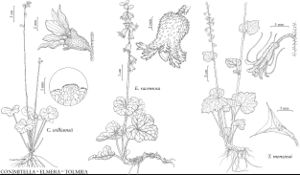Difference between revisions of "Conimitella"
in N. L. Britton et al., N. Amer. Fl. 22: 96. 1905 ,.
FNA>Volume Importer |
FNA>Volume Importer |
(No difference)
| |
Revision as of 23:01, 16 December 2019
Herbs, not rhizomatous, not stoloniferous; caudex scaly. Flowering stems erect, leafless, 25–60 cm, minutely stipitate-glandular. Leaves in basal rosette; stipules present; petiole minutely stipitate-glandular; blade orbiculate to reniform, shallowly 5–11-lobed, lobes rounded, base cordate, ultimate margins crenate, stiffly ciliate, apex obtuse to rounded, surfaces minutely stipitate-glandular; venation palmate. Inflorescences racemes, terminal from axillary buds in basal rosette, 7–15-flowered, bracteate. Flowers: hypanthium adnate to ovary in proximal 1/2, free from ovary 1–1.5 mm, green, yellowish green, or pinkish green; sepals 5, green, yellowish green, or pinkish green; petals 5, white; nectary tissue not seen; stamens 5; filaments filiform; ovary 1/2–3/4 inferior, 1-locular; placentation parietal; styles absent; stigmas 2. Capsules 2-beaked. Seeds dark brown, ellipsoid, warty or smooth. x = 7.
Distribution
wc North America.
Discussion
Species 1: wc North America.
Analysis of molecular data reported by D. E. Soltis et al. (1990) has suggested that Conimitella is far more closely related to Mitella diversifolia, M. stauropetala, and M. trifida than previously believed on morphologic grounds. They made a strong argument for including Conimitella within Mitella; they deferred making nomenclatural changes until further studies are completed.
Species 1
Selected References
None.
